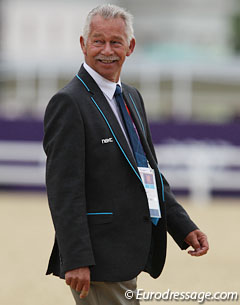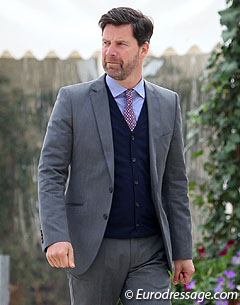
The FEI Sport Forum is rapidly approaching on 10 - 11 April 2017 and the future of dressage judging will be on the table there. In a reaction to the initial findings of the Dressage Judges Working Group, the IDTC, IDOC and FEI Judge General Stephen Clarke has released statements.
At the 2017 FEI Sports Forum in 10 - 11 April 2017, FEI Dressage Director Bettina de Rham and chair of the FEI Dressage Committee Frank Kemperman will present and discuss short-term and long-term solutions for issues encountered in Dressage judging, such as lack of transparency, consistency and clarity.
"The need to introduce a code of points and to concentrate further on education and training of judges across all levels are some of the long-term objectives proposed by the Working Group. The Sports Forum’s delegates feedback on the proposed measures and next steps will further inform the Group’s work," the FEI stated on 15 March 2017.
In a reaction to the publication of the initial findings of the Dressage Judges Working Group, which will be presented at the 2017 Sports Forum, the International Dressage Trainers Club (IDTC), the International Dressage Officials Club (IDOC) and FEI Judge General Stephen Clarke have sent statements to the FEI to be included with the supporting documents.
IDTC Statement on 25 March 2017
The IDTC recognizes the need for development in the dressage judging system.Issues surrounding judging are consistently mentioned be it by spectators, competitors or governing bodies such as the IOC. Dressage is a technically complex sport and therefore judging is not an easy task. We must be constantly seeking ways to make the judging more easily understandable to spectators and to give participants,( riders, trainers, sponsors etc.) confidence that all rides are consistently evaluated on an equal basis and to provide a coherent rationale for the scores. Nothing is perfect and we foresee dressage judging to be a constant work in progress.
 The IDTC proposes a Code of Points based on the current Dressage Handbook would go far to improve the status quo.
The IDTC proposes a Code of Points based on the current Dressage Handbook would go far to improve the status quo.
A Code of Points would clarify the specific impact of each technical fault. It would also provide clear guidance regarding marks for positive elements of a score e.g. expressiveness. The Code of Points would also insure technical correctness must be achieved before a ride can benefit from more esoteric elements such as expressiveness. This would improve riders’ understanding of their score and
should reduce the discrepancies between judges (viewing angle notwithstanding).
The Dressage Handbook is the result of extensive thought , experience and deliberation. It should be the basis of the Code of Points which, in our view, is actually already embedded in this document. To extract a code of points in an easily understandable format is a relatively straightforward task. The IDTC put forth a sample of how this could be achieved at the recent Stakeholders meeting.
The IDTC does not support the proposal to remodel the judging system basing it on the elements of the training scale. The primary reasons for our resistance to this proposal are that we believe it would increase the disparity amongst the judges and would be more difficult for the public to understand than the current system. The elements of the training scale interactive with one another thus it is fundamentally debateable how much of each element is responsible for a particular result. We currently ask the judges to evaluate what they see. To ask them to infer the cause of the observation puts an unreasonable and unrealistic burden on them. Scores should be the outcome of objective observation.
This was a follow-up to an initial March 18 IDTC email:
The IDTC has conducted a consultation regarding many of the items mentioned on the March 13 meeting agenda. Approximately 50 IDTC members responded to the request for input and herewith is a summary of those responses.
- 1. Degree of Difficulty – There was general support for the concept however many/most people
were having teething problems utilizing the App. However there was a general willingness to
persevere. Some need to tweak the difficulty measures are necessary. One major concern was raised regarding inconsistencies of judges’ recognition of combinations etc. and what redress is there for a rider when the judge does not spot a combination. It is suggested that judges have the opportunity to review the programs ahead of the class to facilitate their scoring. - 2. New Tests: There was a moderate desire to refresh tests. The Inter B was criticised as being very difficult especially the passage tour.
- 3. OG Qualification score‐ Overwhelming support to increase this score to at least 66%
- 4. Ranking List‐ Riders supported more emphasis on recent scores and downgrading the impact of major championships
- 5. Generation Games‐ This concept received nearly unanimous support.
- 6. Age limits‐ A majority of respondents supported the lowering of the Pony age to 15. It is felt that
after this age the vast majority of kids are significantly too big for the ponies. This was felt to be
both a welfare issue and also not beneficial to the development of the child’s riding. - 7. Dress Code‐ Respondents were cautiously support of minor changes to the dress code. They
could accept a relaxation of the allowed colours and patterns (e.g. subtle stripes). The
maintenance of the tailcoat was strongly urged. - 8. Judging Working Group‐ The group is clearly open to a change if it succeeds in making the judging more transparent and understandable.
- 9. Rule Change Ideas‐ This will be discussed at our meeting at Blue Hors
Stephen Clarke, FEI Judge General, made this statement on 23 March 2017
I am concerned over recent developments where according to published information relating to the upcoming Sports Forum, the FEI Committee are considering adopting the code of
points as suggested by IDRC. (Not that I have actually seen a full presentation of this
proposed system, only the small example below, which I found very difficult to understand)
 If the FEI Committee are seriously considering this idea, then I don't really see why you/Harald have tasked Mariette with forming a group, which includes Dieter Schule and myself, to begin the long and arduous task of reviewing the handbook. To my mind it will form two very different sets of systems, or not?
If the FEI Committee are seriously considering this idea, then I don't really see why you/Harald have tasked Mariette with forming a group, which includes Dieter Schule and myself, to begin the long and arduous task of reviewing the handbook. To my mind it will form two very different sets of systems, or not?
Would it not be better to wait, before starting the work on the handbook, to have the 'code of
points' that IDRC are proposing demonstrated/tested in a real life pilot scheme so that we
could at least have an idea of the practical effect?
Has it ever been tried out anywhere in reality? When? Where? By whom? How often? How many horses?
Can the IDRC present any reliable results of the advantages?
To think about a system that would change our present judging system worldwide from the highest to the lowest national level would need thorough research, incl. a comparison of the systems in practice on the shows.
As the present 'Judge General' , and presumably leader of our Course Directors, I would think it relevant that you keep me up to date? Maybe we need to clarify the responsibilities of this position?
Then there is the work that our 'Judges education working party' is in the middle of (part 1 is
completed)
Should we really continue with this under these circumstances? particularly as work is already underway to develop the guidelines/code of points (part 2) on how the high level movements must be scored?
Also, as the majority of National Federations naturally follow FEI systems and rules, has the impact on the NFs been considered?
I find it hard to believe that the NFs would consider changing their judging systems and
perform the necessary re-training all of their national judges....(For instance, GB has well over
a 1,000 active national judges...can you imagine what it would take to re-train all these people
to judge in a completely different/new way?)
The implications for both the Para and Eventing sports are also huge.
I am still very unclear about what direction the committee will take in the end...but I really
think that those of us who are doing the work on these projects need to know that we have the
support and confidence of the Committee before we continue.
Also, the Human element has to be taken into account!
It will still be the same group of people working as judges, with inevitably the same
differences of opinion as they have now under our existing system.
I would suggest that the review of the 'Handbook' (re-name it Code of points if you like) is the
way forwards, and that a more up to date and precise system of evaluating the marks to be
awarded would naturally be developed within the new edition, but with the assessment of
quality of the scales of training as the main priority.
My worry, with a rigid 'code of points' system, is that we risk producing future judges with a
policeman like mentality to judge from a 'cooking recipe' using only a tape measure to guide
them, rather than assessing the quality of the horse's way of going.
The result of this could be that the riders will produce horses in the future that are more like
trained poodles, rather than the gymnastically trained dressage horses that show the
suppleness, expression and elasticity that we see in today's sport.
Many of our colleagues and several top riders that I have spoken to feel exactly the same, and
there is the opinion that IDRC does not genuinely reflect the views of the top riders. In fact
many of them are not even members...
In my opinion, everyone's energy could be better spent thinking of ways to deliver more and
consistent training to the judges Worldwide, rather than trying to re-invent the wheel.
I do hope that these issues can be resolved in the very near future so that we can all just get on
with working for the sport.
Hans-Christian Matthiesen, chair of the International Dressage Officials Club (IDOC) followed up on this correspondence with a March 23 statement:
 As we all care for our sport, I think it is nessesary to clarify some of the points that was brought up at the stakeholder meeting in Amsterdam – all of greatest importance for the IDOC.
As we all care for our sport, I think it is nessesary to clarify some of the points that was brought up at the stakeholder meeting in Amsterdam – all of greatest importance for the IDOC.
In difficult times, it is often tempting to makes changes and renew systems – but sometimes its more wise to re-think already existing systems and consolidate and explain. From the minutes I think the position of the IDOC is clear. We dont want to change the existing judging system, we want to consolidate and are open to revision and explaining.
I know, that Stephen Clarke, Judge General, has send you a letter with his opinion, and IDOC support that in every way. I have also read the reply to Stephen – and just to clear things up: The proposed idea, new judging system, was only supported by the IDRC ! The IDOC, AIDEO was against, and so was IDTC, they even pointed out ”that it would be a step back” – however they suggested a new Code of points.
The last decade has changed many things in dressage. Mostly for the good. Sometimes ”critisism” makes you think – and that can be healthy for the system. One of the base-elements of the working group was to identify areas, that could be revised. IDOC is concerned that the background for that is only based on ”perception” and not facts. According to statements from David Stickland and Bettina de Rahm, the judging has improved over the last years.
So we dont want to change the system we have – we want to explain it.
Tranparency is important – accuracy is important.
We need to be able to explain our sport and judging. That is why the IDOC will work on a more codified version of the handbook and tools for judges, that can simplify the (difficult) way to the marks. At the meeting in Amsterdam – a Code of points was suggested by the IDTC – that will be a good starting point for an addition to the handbook, a short version, that can be used by judges and for the spectators to learn and understand. We do understand the need for a clearer structure for the deductions and feel that the Guidelines for Marking would constitute a good basis for the Code Of Point as it is based on the best practices validated by the 5* judges.
The accurate performance will always do good in our sport – but at the same time: Good training according to the training scale, education of the rider and horse also. At the top level we also want to see excellence and quality – and according to the presented system that will not be appreciated – it will not be possible to assess and reward. Judging the technical mistakes is not the problem (according to statistics and JSP) – but rewarding quality can be a challenge. Thats why we have to educate and explain. If we only base our judging system on ”errors and mistakes” it will be very negative and we will end with lower marks and scores.
It is important to maintain the basis, as it is closely linked to the training and welfare of the horse. Our starting point in dressage is ”10” – all riders has the possibility to get a 10 – then the important part for the judge is to assess the quality (find the level and potential) and then point out the technical problems/mistakes to end with the correct mark/score. Statistics will show, that movements that requires a high degree of technical knowledge (eg canter pirouettes) have a tendency to be lower, but movements that includeelements of ”brilliance” (eg extended trot) will be higher.
The key-word is Education.
There will always be differences in judging and results – but that doesnt mean that we should accept it – but the road to accuracy and consistency is difficult. Thats why we have to educate and explain. Education has to be based on experience and pointed in a more individual direction. Evaluation of judging and judges has among other things to be based on evidens and statistics, we have the tool, Dashboard, for that.
A part of the consolidation is focusing on education. NO new system will change the way of thinking and compensate for ”human” mistakes/bias. At the same time we have opened up to ”spectators judging” – that is fun, educating for the spectators – but at the same time – that will always be biased – for the good and the obvious bad!
The revision of the Handbook has in a way already been started – but now postponed, but it is essential that we carry on with this. There has already been made Guidelines for the judges. This is only a working tool for now – but it is an important start.
It is essential for the IDOC that we focus on education – in the future. Starting
now !
We will work on:
- 1. Codifying the handbook including a needed revision, that will include a ”Code of points”
- 2. Shortversion of the handbook (compact edition, catalogue form)
- 3.Handbook and judging-manual for ”dummies” – an educational tool for
spectators and people interested in our sport.
As the IDOC has a lot of support not only from our members but also by top riders and trainers we are certain, that this will be the best way to go forward.
Sometimes you have to be brave to consolidate – a change in judging system will not change the way of thinking – but also not in perception ! We will have to educate and explain. Not to mention the costs and problems for all national federations that will have to change their judging and education systems. The world wants more knowledge – but at the same time any change will not provide that, only uncertainty and confusion – but education in and explanation of the current system will.
Photos © Astrid Appels
Related Links
Dressage Judges Working Group to Present Initial Findings at 2017 FEI Sports Forum
FEI Announces Working Group on Judging and Extended Score Analyses
In the Firing Line: The Dressage System of Judging
Can a Code of Points Improve the Judging System?
IDRC Study Shows Dressage Public Demand More Transparent Judging